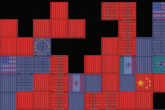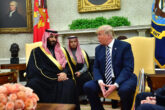
April 26, 2019
Canada and the World, Ep. 38: Preparing for economic crisis
What keeps global economy experts up at night? Is it Brexit, Chinese debt, the impact of technology on work, or the “unknown unknowns” — those issues we haven’t yet anticipated? This episode convenes several guests who were in Washington, D.C. recently for the spring meetings of the International Monetary Fund. With host Bessma Momani, they discuss how long the current global slowdown could last, the impact of bad policy — or a lack of any policy at all — on living standards, and, despite the many areas of concern, why it is best to focus on being prepared for crisis.
Listen to Rachel Ziemba's full interview on the Canada and the World podcast:
More from CNAS
-
Game Over?
The trade wargame suggests that sustained high tariffs could create leverage and urgency to spur action toward a productive restructuring of the international trade system....
By Emily Kilcrease & Geoffrey Gertz
-
Middle East Security / Energy, Economics & Security
Trump Inks $600 Bn Deal In Saudi Arabia | Musk, Blackrock CEO Flank Trump In Gulf VisitIn today's episode of India Global, U.S. President Donald Trump secured a $600 billion commitment from Saudi Arabia on Tuesday to invest in the United States. NDTV's Gaurie Dw...
By Daniel Silverberg
-
Energy, Economics & Security / Technology & National Security
Tariffs and Tech: An Uncertain RecipeHigher tariffs could prompt American cloud companies to shift more of their capital investments abroad....
By Pablo Chavez
-
Trump Tariffs: How Will U.S. Plans Reshape the Global Economy?
Donald Trump says he's already decided the tariffs he will impose on countries that export goods to America, including the United Kingdom. Channel 4 hears from Emily Kilcrease...
By Emily Kilcrease




